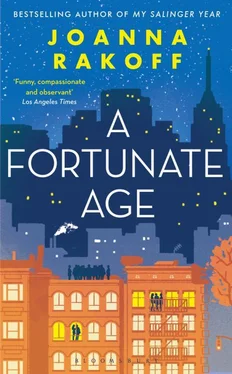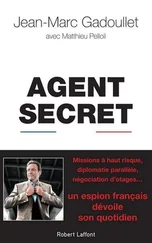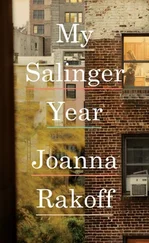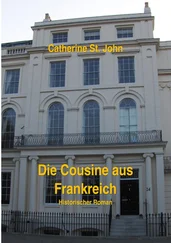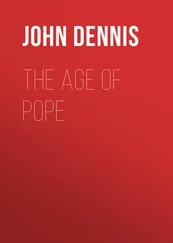As one, the group glared at Taylor and then turned toward Sadie, whose yellowy skin had gone rather white, though she smiled, forcibly, as she rose from the scarred wood floor. Carefully, she made her way back to her seat, at Tal’s right. He tucked an arm around her shoulder. Her hair, in large, loose ringlets—wilder and heavier than Lil’s smooth, glossy waves—sprung up around her long face. Had her eyes, Beth wondered, always been so large, so shadowed? Up close, in the flickering light, she had the aspect of a serious child—a child from a Dutch painting, prematurely aged by the rigors and politics of court. How could Taylor have caught the bouquet, Beth thought, angrily. Taylor, who wasn’t even invited . The evening had soured for her. Was it bad luck, she thought, for a stranger to catch the bouquet? Did this bode poorly for Lil’s marriage? No, no, of course not. Across the table, Lil leaned heavily against Tuck’s shoulder, her eyes drooping with fatigue.
“It’s time,” said Sadie, meeting the eyes, pair by pair, of her friends, “for all of us to go.” And so they gathered their coats and shawls and bags, pecked Lil and Tuck on the cheek, and offered a final congratulations.
Outside, the air had turned cold, wintery, the harvest moon hanging low in the black sky, orange and unreal, like a painted set. The girls shivered in their thin coats and shawls. Dave offered his cigarettes around, pulling one from the pack with his lips, then lighting one for Sadie. They began walking west, toward Bedford, the populated part of Williamsburg. “That was really fun, wasn’t it?” sighed Sadie. The others nodded their assent and quickened their step, for the air was growing cooler, it seemed, each moment, as they drew closer and closer to the river. Instinctively, they huddled together as they crossed under the BQE overpass, a desolate, graffiti-covered tunnel, the girls stepping gingerly in their delicate shoes to avoid the broken beer bottles and black, desiccated banana peels that lay at their feet in scant piles.
“I’m so tired,” said Beth, with a shiver, her voice echoing in the dank little hollow. A quick wind picked up scraps of trash—plastic grocery bags, candy wrappers—and swirled them in their direction, the fruit scent of rotting garbage filling their mouths. “Maybe we should just go home.”
“We can’t go home yet,” Will Chase shouted from behind them. “Be strong, Beth Bernstein, there is liquor to be drunk.”
“First round’s on me,” called Ed Slikowski, who was half jogging down the street. “Let’s drink to the love!” he shouted.
Emily looked at Beth. “It’s freezing,” she whispered. “Maybe you’re right.”
But then they were back under the cover of the city’s black, monolithic sky. There were, Beth saw, no stars. Not one. The wind died down—or perhaps it had been a product of the tunnel—and the air cleared, smelling now of leaves and gasoline and a thousand other things coming from the thousands and thousands of cars and houses and people and dogs and cats that surrounded them.
“We’re almost there,” said Sadie. And it was true, they were only a few long blocks from the water—with their next step, the orderly lights of the Manhattan skyline, beaming across the river, began, slowly, to enter their line of vision.
As Beth followed Will Chase down the dim hallway leading to his apartment, a peculiar notion insinuated itself into her brain. Some months earlier, Lil had walked down this same corridor with Tuck, to do, perhaps, the same things she might now do with Will. Not that she had decided she was going to do anything with Will—she still wasn’t even sure if she liked or hated him. And not that she knew whether he actually wanted to do anything with her. An hour earlier, as they’d finished dinner, at a dark Mediterranean restaurant with walls of bright mosaic, he’d asked if she had “plans for the rest of the evening.” She was rather taken aback by this question, seeing as it was eleven o’clock on a Wednesday night—four days after Lil’s wedding. What exactly might she have planned at such an hour?
“Well,” she said, smiling, “I am supposed to meet some friends at the Tunnel, but that’s not until four. So I guess you’re stuck with me for, oh”—quick look at her watch—“another four, five hours.”
“Would you like to take a stroll, then? The weather’s gorgeous. And the moon is out.” Somehow, the clipped tones of his voice managed to drain whatever romantic potential Beth might have wanted to associate with words like “moon” and “stroll.” Alarmingly, he stuck his head under the table. She snapped her legs closed. “You’re not wearing ridiculous shoes, are you?” She gestured toward her boots—calf-covering things with low square heels, which she’d bought the day before at a loud shop on Eighth Street—and they ventured off down Berry Street, then west, toward the river, where he showed her a giant mound of glass—blue, clear, a thousand shades of green—glinting in the white moonlight. “Is it for recycling?” she asked, hating the studenty tone of her voice.
“Don’t know,” he said, shoving his hands in his pockets and rolling back on his heels. “But it’s gorgeous, isn’t it?”
They walked for blocks among Williamsburg’s low houses, which were certainly not gorgeous, she thought, with their vinyl siding and creaky metal awnings, decrepit warehouses with flat, narrow banks of windows, garbage on the street. Why did her friends want to live here, in this ugly place? But maybe there were parts that were nicer, the streets lined with soothing brownstones, like where Dave had grown up. When Emily and Lil and Tal had talked about living in Brooklyn, she’d pictured Dave’s parents’ apartment—preposterously narrow, lined with bookcases, wedding cake moldings—and their shady, quiet block, with its tall stone stoops, the onyx facade of the funeral home on the corner.
“I think Emily lives near here,” she said, stopping at a dark corner and peering down the street they were about to cross. “North Eighth Street, I think. That’s her street.”
“Do you want to stop in?” Will asked, in such a way that the question sounded rhetorical.
“No, no, no.” Beth flushed, feeling suddenly stupid, though not exactly sure why. Was it such a banal thing to mention that her friend lived nearby? Was that what he was implying? “I just… she’s probably not home.” She studied the buildings around her, with what she hoped appeared to be cool, anthropological interest: a barely lit bar, the restaurant in which they’d eaten—somehow they’d doubled back and she’d not realized it—and a lawn on which the Virgin Mary stood, hands clasped in prayer, a sky-blue plaster shell at her back. Was Lil and Tuck’s place near here, too? It was hard to tell.
“Then would you like to come to my place?” asked Will. “For a nightcap?”
“Um, sure,” said Beth. She wasn’t necessarily enjoying herself, but she wasn’t yet ready to give up on the possibility of enjoying herself. And she was flattered. He’d seemed only half interested in her all evening, inspecting the coterie of pretty women at the restaurant’s bar (all of them somehow sharper than she), while she, perhaps, talked too long about her family (“My mother is the best!”) and Astoria (“Lil said there wasn’t any place even to get a cup of coffee, and she was right”) and the classes she’d taught that summer (“I totally overloaded the syllabus”) and Dave, whom she’d not meant to talk about, but of course, did (“It was just so weird to see him”). But then there they were, passing under the slender trees of Havemeyer Street—just beginning to shed their spade-shaped leaves—and into the glaring light of his building’s bare, ugly lobby. He twisted open a battered tin mailbox and extracted a sheaf of envelopes and flyers, then guided her up a flight of stairs and down a short hallway to a shiny new steel door. The door, it turned out, opened directly into the apartment’s sitting room, a sparsely decorated space, with a neat white couch on one wall, a fussy little chair facing it, and a square kitchen table in the far corner. To her left, she saw a small bedroom, the mere glimpse of which made her flush. And around a corner, a tiny kitchen—really just a walled-in section of the living room—with plants on dusty shelves bolted across the windows.
Читать дальше
